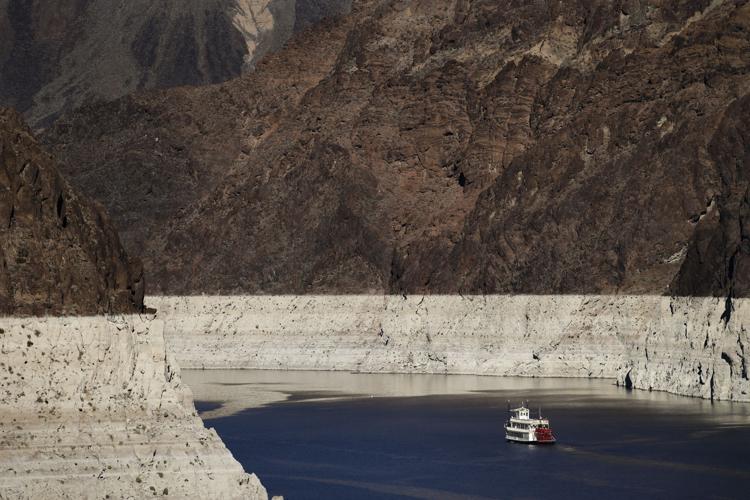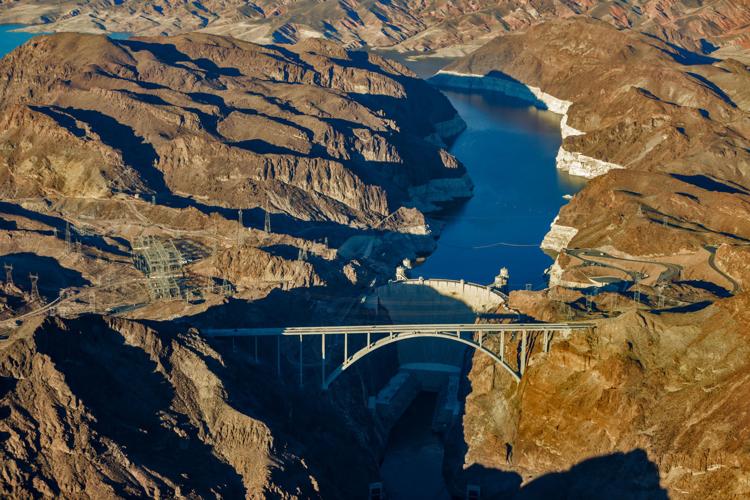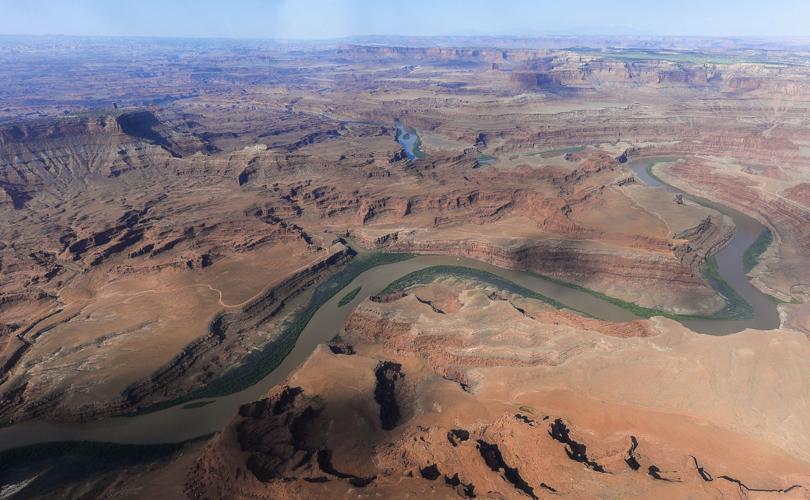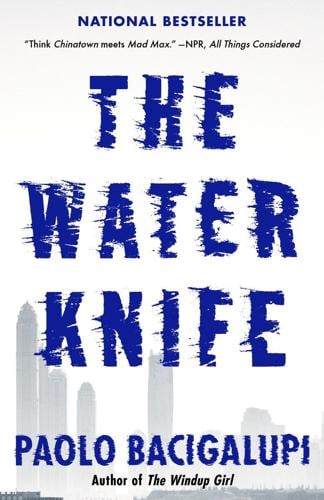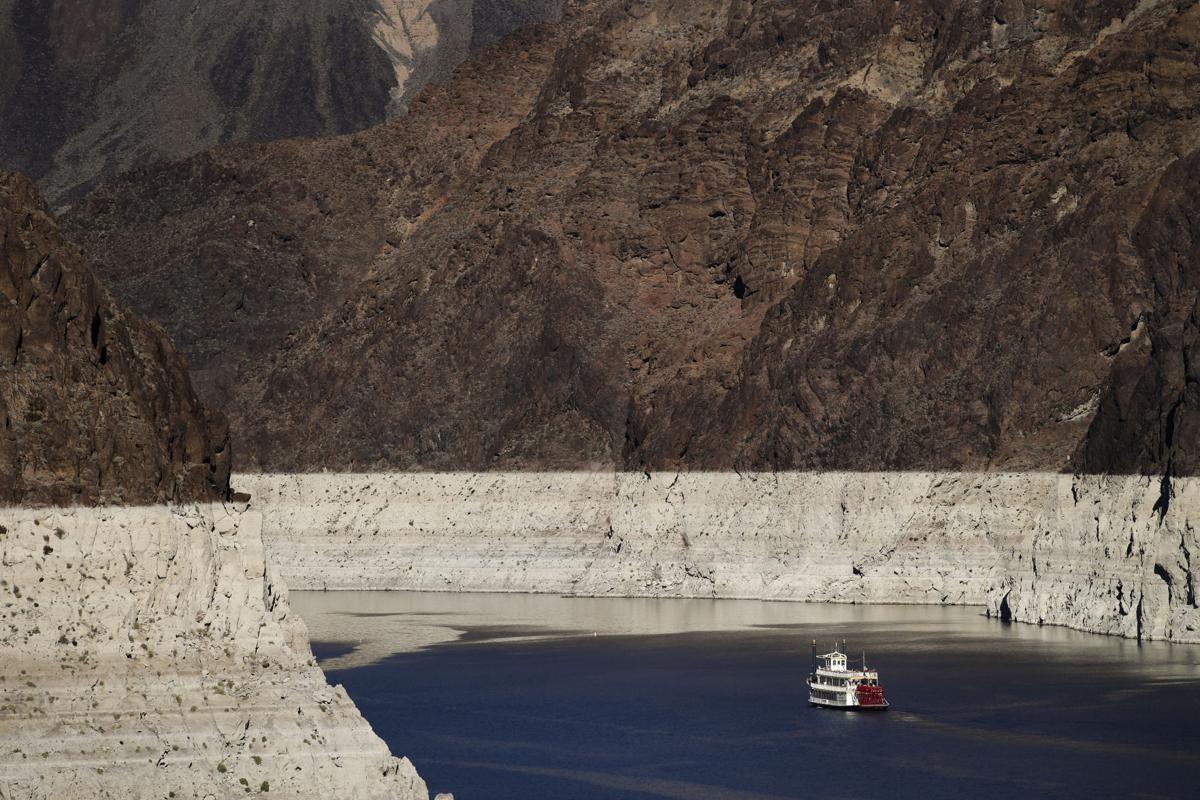Our third book club pick makes us want to pour a tall glass of ice water and savor every sip.
For the months of May and June, we'll be reading "The Water Knife" by Colorado-based author Paolo Bacigalupi, a past Tucson Festival of Books speaker.
Unlike our past two choices — "Veil of Roses" by Laura Fitzgerald and "Margot" by Jillian Cantor — this book doesn't come from a local author, and it's way darker.
But we just couldn't pass it up.
"The Water Knife" is mostly set in Phoenix some time in the near, dystopian future. Water is scarce, the suburbs are ghost towns and refugees from drought-stricken Texas stream across the borders.

The novel imagines a dystopian Phoenix sometime in the near future when the water has dried up.
Except moving between states isn't so easy in an America with a flimsy federal government and states that patrol their own borders with tactics that make the Wild West look tame. That's what the Big Daddy Drought does to people.
The book follows three characters who find themselves in Phoenix as it collapses: Lucy, an East Coast journalist covering the decline, Angel, an assassin and "water knife" hired by Nevada to make sure Las Vegas gets its share of the Colorado River and Maria, a young Texas refugee who's just trying to survive.
This is a thriller that starts a bit slow and then picks up as characters scramble to get their hands on water intel that could pump new life into Arizona's dusty capital.
The book is graphic, with bullets and bodies now commonplace in Phoenix. It also has a few racy scenes. If that kind of thing makes you squeamish, we recommend skimming those parts. Overall, the storyline swept us along and made us think about why and how we live in a desert.

Read books with us!
Since the book is longer than our last two reads, we'll take May and June to read it. You can join us on Facebook in the #ThisIsTucson Book Club group, where we'll post questions every other Thursday. On Thursday, May 18, we'll discuss Chapters 1-12.
Bacigalupi's other books and short stories have won a ton of awards, including prestigious Hugo, Nebula and Michael L. Printz awards, among others. "The Water Knife" is a New York Times bestseller. For a complete list, visit windupstories.com/author-info/paolo-bacigalupi.

Paolo Bacigalupi published "The Water Knife" in 2015.
"The Water Knife," published in 2015, was a long time coming. Bacigalupi also edited the environmental magazine "High Country News" for about four years.
More than 10 years ago, he wrote the short story "The Tamarisk Hunter" on drought in the Southwest — the eventual foundation for "The Water Knife." Then in 2011 he visited Texas in the midst of its driest year on record. Crops withered, wildfires raged and trucks shuttled water to parched towns. In the midst of it, former Governor Rick Perry issued a proclamation calling on Texas to pray for rain — the basis for a class of religious characters in the book known as "Merry Perrys."
With a growing population in the West and a shortage of water in the Colorado River, Bacigalupi realized the drought he saw in Texas could be the future for the region.
And we are seriously unnerved just reading about it.
Here are three reasons we think "The Water Knife" is worth reading.
Three words: Central Arizona Project.
While researching this book, Bacigalupi followed the Central Arizona Project canal from its intake at the Colorado River to some of its different stops in the desert. In "The Water Knife," Phoenix's water woes are heightened by the fictional bombing of the CAP canal.
CAP is one of the reasons Bacigalupi decided to set his desert dystopia in Phoenix.
"Honestly, it was a combination of the sheer improbability of Phoenix generally..." he says. "Phoenix is the end note, and Tucson as well, of this extraordinary amount of engineered prosperity we have. Snow will fall thousands of miles away ... and the snow melt gets pumped uphill and through 300 miles of desert to its final destination and that's amazing."
A visit to CAP's website immediately urges you to help protect Lake Mead, a reservoir in northwestern Arizona and southeastern Nevada that supplies Colorado River water to Arizona, Nevada and California. The three states are in the process of working out a Drought Contingency Plan as the water levels in the reservoir dip closer to a point that triggers water cuts for Arizona and Nevada. Luckily, a year of big snowstorms offset that a bit.
The book is fiction but there are some facts here we can't ignore: CAP provides water to both Phoenix and Tucson, and the water allocated to us in the lower-basin states is more than what's available, even if there is no drought. The river and canal are our lifelines in the desert.

A 2015 file image shows a low water level in Lake Mead reservoir and Hoover Dam with a “bath tub ring.”
It hits (too) close to home.
Tucson is just a mention in "The Water Knife," but it is not a good mention. Basically, we have already gone the way Phoenix is going.
Beyond Bacigalupi's knowledge of Colorado River Basin water rights, he also adds in details that make you shudder — a poster of granny-aged Britney Spears with no teeth, REI dust masks and CamelBak relief operations. It feels too real. Anyone who has taken a drive north on Phoenix's criss-crossing freeways can imagine abandoned urban sprawl and empty swimming pools. This is not a faraway future.
"I would hope that my reader looks a little more closely at where their prosperity is coming from and asks a few more questions about how stable that prosperity actually is," Bacigalupi says. "I was just at a sort of water and climate symposium, and it was really interesting to hear from a variety of experts involved in making sure Phoenix does have stable water supplies and hearing from them how difficult it is for the public to pay attention ... I would like people to feel a lot less secure. ... The amount of snowpack in the Rocky Mountains makes you vulnerable down there. It's the things we aren't looking at that bite us."
You'll pay more attention when you hear about water woes.
It's easy to crank up the AC, gulp a bottle of water and pretend that water shortages on the Colorado River don't affect us.
But this book forces you to imagine some pretty scary what-ifs.
"The place where I live is actually on the north fork of the Gunnison River, which is a tributary of the Colorado River..." Bacigalupi says. "Snowmelt on the mountains above me will end up in Tucson. We're all connected in this big geographical basin to one another."

The Colorado River, part of it seen here in southeastern Utah, is the lifeline for the Southwest, providing drinking water for Tucson, Phoenix, Los Angeles, San Diego and Las Vegas.
Bacigalupi is a big believer in climate change and its ability to "exacerbate drought and water scarcity" in a way that makes other parts of society fall apart more easily.
"The southern U.S. and the South are more vulnerable to mega droughts in the future..." he says.
That's how he eventually viewed his 2011 trip to Texas: As a trip to the future.
"In that moment, you say, 'Here I am in this terrible drought ... and it's like time traveling. I've popped into the future and this is what it looks like and it's scary,'" he says. "There are lots of pressures on the system that you never thought about, places where water connects to prosperity."
Bacigalupi uses fiction to further develop that possibility, creating characters that are more relatable than data, water levels and scientific projections.
"Fiction gives you the opportunity to live inside the skin of someone you haven't met before," he says. "It gives you empathy for the unknown and unrecognized person. With the kind of stuff I write in science fiction, you can build that connection to your future self, someone who is fairly abstract, and what your child's future is going to be like."
We sure hope not.


